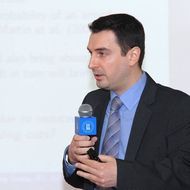- A
- A
- A
- ABC
- ABC
- ABC
- А
- А
- А
- А
- А
- HSE University
- Faculty of Economic Sciences
- Department of Theoretical Economics
- Events
- Department of Theoretical Economics Research Seminar with Maria Shchepeleva, HSE
-
Department
109028, Moscow,
Pokrovsky Boulevard 11, Rooms: S1029, S1030
Phone: +7 (495) 772-95-90*27172, 27173, 27174
The Department of Theoretical Economics brings together highly qualified specialists in various fields of economics, including micro and macroeconomics, monetary and financial theory, economic history and the history of economic thought. Our mission is to teach economic disciplines at HSE on the level of leading Western universities.
Dranev Y., Miriakov M., Ochirova E. et al.
Journal of Corporate Finance Research. 2024. Vol. 18. No. 1. P. 5-19.
Olga Demidova, Elena Kayasheva, Artem Demyanenko.
In bk.: Eurasian Business and Economics Perspectives: Proceedings of the 38th Eurasia Business and Economics Society Conference. Vol. 25. Springer Publishing Company, 2023. Ch. 13. P. 209-232.
Tabashnikova D., Sandomirskaia M.
Economics. EC. Высшая школа экономики, 2023. No. 263.

Department of Theoretical Economics Research Seminar with Maria Shchepeleva, HSE
Dear colleagues,
Department of Theoretical Economics invites you to attend the research seminar with Senior Lecturer Maria Shchepeleva, HSE
Date: December 7, 2021
Time: 1:00 p.m.
Working language: English
Speaker:Maria Shchepeleva, Senior Lecturer of the Department of Theoretical Economics
The link to Zoom: https://us02web.zoom.us/j/81369234987?pwd=SHR6c3JZWXk5SDJNSzJuY0tFazN2Zz09
Meeting ID: 813 6923 4987
Passcode: 118140
Title: "Modeling global real economic activity: Evidence from variable selection across quantiles "
Abstract: We conduct a search of predictors of global real economic activity in a predictive quantile regression framework. To this end, we use four alternative proxies of global real economic activity during February 1997-August 2019 and build on a combination of machine learning algorithms to identify their predictors out of 23 candidate explanatory variables. The contemporaneous level of global real economic activity, the Asian and US financial stress are found the most robust predictors. US financial shocks undermine global economic growth when it is below the median, whereas they do not matter much when the world economy expands fast. Besides, US shadow interest rates are significantly and positively linked to global real economic activity. This effect holds when the world economy is expected to grow fast. It is driven by increasing US policy rates which, contrary to the conventional wisdom, entail US dollar depreciation rather than appreciation. A weaker US dollar stimulates dollar-denominated cross-border bank inflows to the countries other than the USA, leading to a rise in real investment worldwide, which eventually results in industrial output growth. Interestingly, global volatility and risk aversion measures, including the VIX index, oil price shocks, policy uncertainty and public sentiment variables do not contribute much to modeling future global real economic activity at any quantile.
- About
- About
- Key Figures & Facts
- Faculties & Departments
- International Partnerships
- Faculty & Staff
- HSE Buildings
- Public Enquiries
- Studies
- Admissions
- Programme Catalogue
- Undergraduate
- Graduate
- Exchange Programmes
- Summer University
- Summer Schools
- Semester in Moscow
- Business Internship
-
https://elearning.hse.ru/en/mooc/
Massive Open Online Courses
-
https://www.hse.ru/en/visual/
HSE Site for the Visually Impaired
-
http://5top100.com/
Russian Academic Excellence Project 5-100
- © HSE University 1993–2024 Contacts Copyright Privacy Policy Site Map
- Edit






